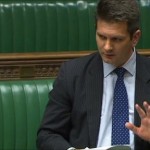
This week, following the promotion of Michael Fallon MP to BIS, I’m bidding for election by Conservative colleagues to the Treasury Select Committee.
I’d like to scrutinise and help the Treasury as it charts a course to reduce the deficit and mend the public finances. I’d also like to continue to challenge the leaders of some of our other key economic institutions, like the Bank of England.
As readers of this site will know, I offer strong market principles, familiarity with economic and public choice theory and deeply-held views about the morality and efficacy of a free society. I co-founded The Cobden Centre, an educational charity for honest money and social progress and I now chair the All Party Group on Economics, Money and Banking.
Below, I have selected five indicative speeches on economics. My many articles are available on this site and at The Cobden Centre.
If this is capitalism, I am not a capitalist. In a General Debate on the Economy last year, I explained that what the public and politicians were attacking was not capitalism but a dangerous form of statism:
I agree that the current debt-based and—I am afraid to say—statist system cannot endure. However, if this system is not to endure, which way should it fall? [Humanity] tried the statist direction in the past and it led to misery and murder. I stand for free markets and free co-operation, but I say this to the House: if this is capitalism, I am not a capitalist
Inflation is not harmless – it widens wealth inequality unjustly. In a speech on QE and inflation, I said that increasing the money supply hurts the poor and benefits the rich (this was borne out by the Bank of England):
Inflation is not harmless. It widens wealth inequality and creates patterns of employment that are sustained only by increases in the money supply. For those of us who are sincerely concerned about jobs and growth, it is time to consider whether we should not expect to create employment simply by increasing the money supply.
If money is a product of the state, we should ask ourselves, “Is this a good idea?” In my maiden speech, I asked whether allowing the state a monopoly of money is a mistake and one of the root courses of our current predicament:
Today, money is a product of the state. The Bank of England controls the price, quantity and quality of money. Perhaps if we were talking about any other commodity, there would be far less confusion over and questioning of the cause of the crisis. If money is a product of the state, we should ask ourselves, “Is this a good idea?”
With key decision makers’ own wealth at risk in banks, they would take responsible decisions instead of expecting rewards for failure. I introduced a bill that would minimise moral hazard within the financial system by ensuring that those who take risks are held personally liable for the consequences:
My Bill would make directors of financial institutions personally liable for losses. It would ensure that losses came first out of institutions’ bonus pools then directors’ personal bonds before hitting equity.
Under new Labour, the money supply expanded from about £700 billion in 1997 to £2.2 trillion in 2010. During the last Budget debate, I told the House that the money supply had been expanded recklessly under Labour, which created a false boom and harmed those people that party seeks to defend:
Over the past 13 years under new Labour, the money supply expanded from about £700 billion in 1997 to £2.2 trillion in 2010. That was through a massive expansion of bank balance sheets—a huge amount of monetary activism led by central banks, with the Bank of England keeping interest rates too low for too long.
There is much else I might say: I hope to do it from the platform of this influential committee. I hope colleagues will allow me the opportunity to bring fresh thinking to an already expert team.
This is excellent news Steve. I’d love to see the Bank of England and others being scrutinised by someone who actually understands money. Fingers crossed for the election process.
Good luck with that one Steve…..I particularly like the idea below you stated …
My Bill would make directors of financial institutions personally liable for losses. It would ensure that losses came first out of institutions’ bonus pools then directors’ personal bonds before hitting equity.
It’s always good to have independent thinkers in such positions. Good luck, and if elected stay bold!
Let’s hope the vested interests of financial institutions don’t get in the way of progress and prevent your selection.